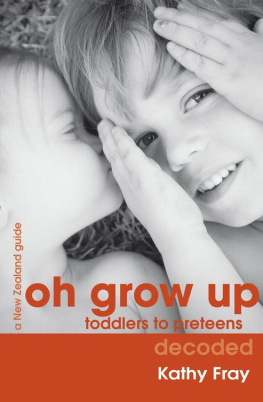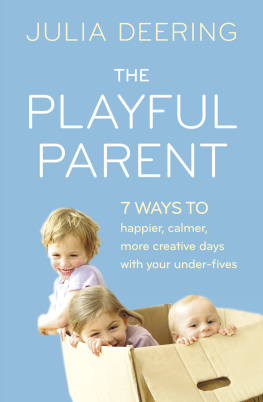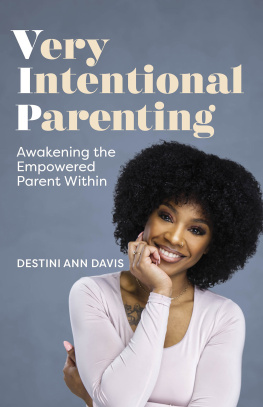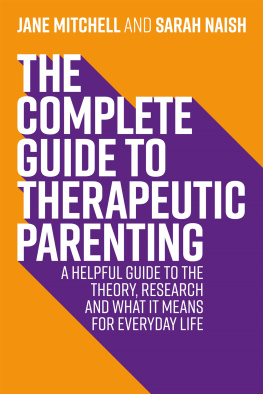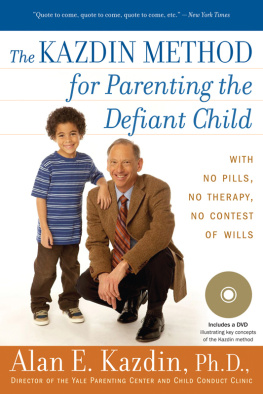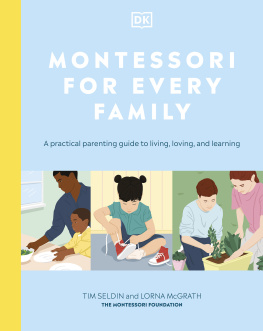Parenting
Kathy Walker is a leading education and parenting consultant and runs popular workshops for parents and teachers on a range of topics, including school readiness, self-esteem and resilience. She is a regular contributor to the education section of The Age, and frequently appears as a parenting expert on ABC Radio. A former teacher and university lecturer in education, Kathy is the author of the bestselling book for parents Whats the Hurry? and the teachers guide Play Matters. For more information please visit earlylife.com.au.
Parenting
A practical guide to raising preschool and primary-school children
KATHY WALKER
VIKING
an imprint of
PENGUIN BOOKS
VIKING
Published by the Penguin Group
Penguin Group (Australia) 250 Camberwell Road, Camberwell, Victoria 3124, Australia (a division of Pearson Australia Group Pty Ltd)
Penguin Group (USA) Inc. 375 Hudson Street, New York, New York 10014, USA
Penguin Group (Canada) 90 Eglinton Avenue East, Suite 700, Toronto, Canada ON M4P 2Y3 (a division of Pearson Penguin Canada Inc.)
Penguin Books Ltd 80 Strand, London WC2R 0RL, England
Penguin Ireland 25 St Stephens Green, Dublin 2, Ireland (a division of Penguin Books Ltd)
Penguin Books India Pvt Ltd 11 Community Centre, Panchsheel Park, New Delhi 110 017, India
Penguin Group (NZ) 67 Apollo Drive, Rosedale, North Shore 0632, New Zealand (a division of Pearson New Zealand Ltd)
Penguin Books (South Africa) (Pty) Ltd 24 Sturdee Avenue, Rosebank, Johannesburg 2196, South Africa
Penguin Books Ltd, Registered Offices: 80 Strand, London WC2R 0RL, England
First published by Penguin Group (Australia), 2010
Text copyright Kathy Walker 2010
The moral right of the author has been asserted
All rights reserved. Without limiting the rights under copyright reserved above, no part of this publication may be reproduced, stored in or introduced into a retrieval system, or transmitted, in any form or by any means (electronic, mechanical, photocopying, recording or otherwise), without the prior written permission of both the copyright owner and the above publisher of this book.
penguin.com.au
ISBN: 978-0-67-007422-8
To S.B., a great parent and wonderful role model
Introduction
When you become a parent you become part of a whole new family. This is true whether you are a single parent or part of a couple; male or female; heterosexual or gay; a biological, adoptive or step parent, or a grandparent with parenting responsibilities. Whatever your domestic arrangements, you and your family will take time to adjust. Some days your concerns will seem endless: just when you think youve cleared one hurdle, another will spring up to take its place, undermining your confidence. Thats why you need to be gentle and patient with yourselves and your children. It sounds obvious, I know, but if we all relaxed a little, took our time, didnt demand too much too soon, and didnt expect ourselves or our children to be perfect, wed feel happier and our children would probably be better behaved.
There is no such thing as the perfect family. Parenting takes effort and presents many challenges. Inevitably there will be distressing times, but then, just when you least expect it, something wonderful will happen to give you the boost you need to keep going.
Lately Ive had a real battle to get Emily [four] to have her bath. It doesnt matter what toys are bobbing about in there, or who comes in to sit with her, she just refuses. The other day Id run the bath and she did her usual arms folded and refusing trick. I had the baby screaming in his high chair and I was trying hard not to raise my voice. Then just as I was about to tear my hair out she turned to me and said, I dont want to have a bath, but I love you sooooo much! It may not have helped me get her into the bath, but it certainly made me feel better about it all!
Amanda
I meet so many parents who are anxious that their children will miss out if they dont start learning to read and write, swim, play tennis and do gymnastics before they are three. Yet there is no evidence that if our children do more, learn earlier or practise more often they will automatically be happier or more successful. In fact, the opposite can be true: children who are overscheduled often display inappropriate behaviours simply because they are exhausted.
Children dont need to be entertained at birthday parties by paid comedians and they dont need their parents to spend thousands on designer bedrooms. They do, however, need opportunities to share special events like birthdays with friends and family, as well as plenty of time to play and simply be with you.
You dont need to employ a super nanny to fix your children, either. You might from time to time require additional support someone to talk to or someone who can offer suggestions. But the idea that day-to-day parenting challenges are best outsourced to an expert only makes parents feel inadequate and incompetent.
This book has two key messages for parents and the wider community messages that I hope will come as a relief to all parents and carers who read it. Firstly, children dont have to be perfect, and actually cant be, given that they are children. Secondly, and more importantly, you as parents dont have to be perfect either. You dont actually have to be super any more than you need someone else being super for you and your children. You can be yourselves as parents, and children can be themselves.
Parenting children has nothing to do with training them to sit on naughty spots or in the naughty corner, and certainly nothing to do with expecting them to perform or entertain others. Rather than training, it is more helpful to think of nurturing our children through their stages of development. Nurturing describes how we as parents might provide the gentle guidance and understanding that children require as they grow up. But how do we find enough time to nurture when we are also working, paying bills, shopping, socialising and looking after the physical needs of our family? How can we get off the domestic and professional conveyor belts that seem to move faster with every passing day?
The first step is to realise that only we can recognise when we are stressed and overworked. Though children may respond to changes in our moods (see ), they cannot be expected to know why Mum or Dad sometimes seems impatient or sad. When you have told them to go back to bed five times in the last two hours, they are not likely to respond with, Sure. Why didnt you mention you had an early morning appointment at work tomorrow? I would have tried harder to get to sleep.
To be effective in our parenting, not only must we understand our children how they develop and learn, what motivates them but we must also understand ourselves what we can expect of ourselves as parents and when we need to ask for help. To understand is to accept. To understand is to gain extra patience when its needed. Understanding helps us feel confident in the decisions we need to make. And when we are confident and reflective parents, our decisions are more likely to be wise and discerning. Its a positive cycle.
Our children have a right to our care and respect. That is why I have written this book, and probably why you are reading it. My aim is to empower you to help you be more relaxed about your parenting so you can enjoy your children more and worry about their behaviours less, knowing you have a range of practical strategies to hand when you need them.
I have focused on children in the preschool and primary school years for several reasons. Many books have already been published about parenting babies and toddlers but there are far fewer aimed at parents of preschoolers and primary-school-aged children. Parents often put a great deal of energy into raising babies and toddlers, perhaps assuming that this investment will make later years a breeze. In fact, each stage of life brings its own challenges, and parents need just as much support to nurture their children in the preschool and primary years.
Next page

